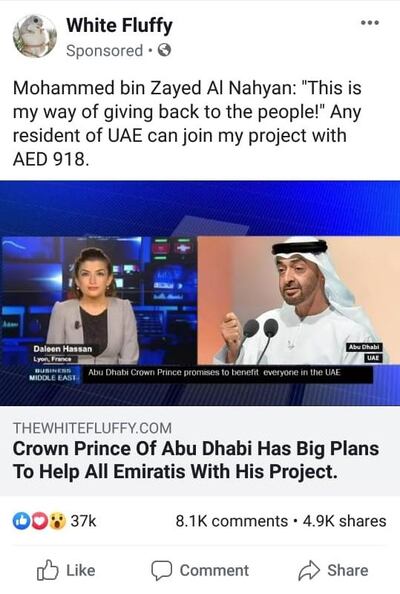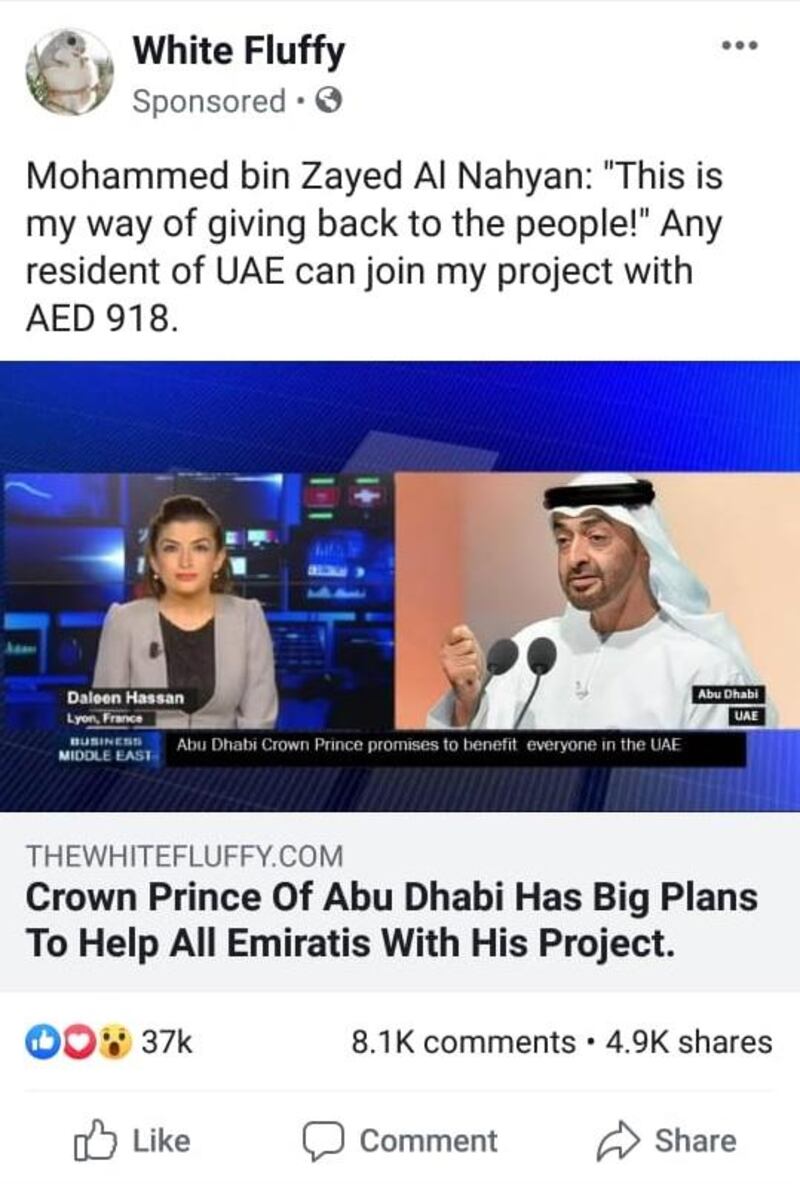UAE residents have been warned not to be tricked by a scam in which fraudsters falsely claim Abu Dhabi’s Crown Prince is helping people make huge profits from Bitcoin trading.
The fraud uses a fake news story to claim Sheikh Mohamed bin Zayed, Crown Prince of Abu Dhabi and Deputy Supreme Commander of the Armed Forces, had introduced and personally endorsed a scheme that costs almost Dh1,000 to join but would make participants “rich in seven days”.
Thousands were apparently taken in, publicly sharing phone numbers and email addresses with criminals.
Facebook has taken action by deleting a page – apparently run from Ukraine and Argentina – which had been spreading the scam for weeks.
Fraudsters used a promotional post to direct people to the fake story, which appeared unsolicited in UAE residents’ news feeds. The post included Sheikh Mohamed’s picture and was marked as ‘sponsored’.
The post also included a fabricated quote from the Crown Prince of Abu Dhabi, saying the phony Bitcoin scheme was “my way of giving back to the people”.
Facebook removed the post and page, which also included links to other scams, after The National enquired about it.
The Abu Dhabi government also moved to remind residents to be aware of the dangers of fraud, particularly online, and to seek to verify any information by checking with official channels, in response to the scam.
“I was stunned to see the number of likes, comments on the post and shares on the post,” said Jitendra Alwani, a Dubai-based digital marketing expert who posted a warning about the scam after it appeared on his feed.
The 29-year-old, an Indian national who has been living in Dubai for two years, said he believed Facebook should be more vigilant in the content it promotes.
“My opinion is Facebook ads are being pushed without scrutiny,” he said.
“They should audit all accounts and verify the details. I’m sure they have the technology. Not everyone is digitally literate.”

Even the supposed author of the article, named as ‘Michael Alvarado’, who tells readers he had made Dh26,000 in a fortnight, was fake. The writer pictured is in fact Timothy Seppala, a US-based freelance journalist, who has no connection with the scam and confirmed his picture is being used without his permission.The fake news story scattered legitimate information, including factual details of a huge stimulus plan devised by Sheikh Mohamed, alongside fabricated information in an effort to convince readers the scheme was legitimate.
The 'sponsored' Facebook post sharing the scam, including an image of Sheikh Mohamed, was shared about 5,000 times and attracted more than 8,000 comments, many sharing personal information and expressing interest in 'investing'. It is not known how many people handed over cash.
The fake news story also included made-up quotes from Bill Gates, the Microsoft founder, supposedly endorsing the scheme. A tweet from Sheikh Mohamed’s account had also also been fabricated.
People are urged to spend Dh918, or $250, to sign up to an external website, Bitcoin Loophole, which claims to be a Bitcoin trading platform in which members “generally make a minimum of $13,000 every single day” but has been exposed as a scam. Fictitious ‘reviews’ from people across the UAE are included in the fake news story.
A spokesman for Facebook said it had taken action to remove the posts and page promoting the scam once it was brought to its attention.
“We want people to be able to trust the connections they make on Facebook,” the spokesman said.
“Claiming to be another person on Facebook violates our community standards, and we have a dedicated team that’s tasked with helping to detect and block these kinds of scams.”
The incident follows other cases of well-known public figures having their images misused by fraudsters operating on Facebook.
Earlier this year, Martin Lewis, a British consumer finance journalist, sued Facebook and claimed it had not done enough to prevent his image being used in scams. He dropped the case after the company agreed to donate £3m (Dh14m) to set up an anti-scam project and launch a UK-specific one-click reporting tool.
In a statement, the Abu Dhabi Media Office urged the public to be vigilant, particularly when it came to requests to hand over money online.
“It is strongly advised that people check the authenticity of campaigns asking for pledges or donations in case of fraud, particularly online and on social media," the statement said.
“Authorised communications for Abu Dhabi, its leaders and its government are shared through ADMO channels @admediaoffice and mediaoffice.abudhabi.”







